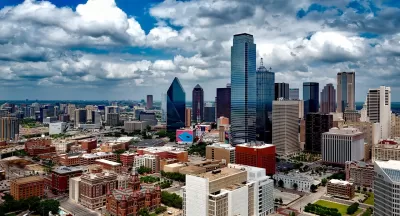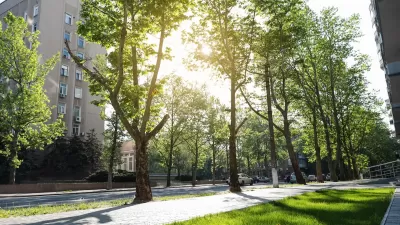Neither environmentalists nor developers like the city’s current regulations around tree removal, but there is praise on both sides for the “smart and nimble” new version.

The existing tree ordinance in Dallas, according to Peter Simek of D Magazine, has the unfortunate distinction of having “been a bane for developers and environmentalists alike.”
But starting this week, the Dallas City Council will be reviewing a revision that Simek calls “a smart and nimble policy that is born out of some long and difficult negotiations.”
For example, while the original ordinance does not distinguish between species of trees, the revision imposes heavy fines removing elms, oaks and pecans but no fines on removal of invasive species; the current ordinance does not take into account the age of trees removed—meaning that a very large tree can be replaced with lots of very small trees that may or may not survive—but the new ordinance tries to take size and survival rate into account.
And the reforestation fund developers pay into, which currently has little oversight, will now go towards creating an “urban forest master plan” and paying someone to implement it.
A number of studies released in recent years show that the quantifiable economic and health benefits of an urban tree canopy far outweigh the costs.
FULL STORY: After More Than 20 Years, Dallas May Finally Fix Its Broken Tree Ordinance

Montreal Mall to Become 6,000 Housing Units
Place Versailles will be transformed into a mixed-use complex over the next 25 years.

Planetizen Federal Action Tracker
A weekly monitor of how Trump’s orders and actions are impacting planners and planning in America.

DARTSpace Platform Streamlines Dallas TOD Application Process
The Dallas transit agency hopes a shorter permitting timeline will boost transit-oriented development around rail stations.

Study: 4% of Truckers Lack a Valid Commercial License
Over 56% of inspected trucks had other violations.

Chicago Judge Orders Thousands of Accessible Ped Signals
Only 3% of the city's crossing signals are currently accessible to blind pedestrians.

Philadelphia Swaps Car Lanes for Bikeways in Unanimous Vote
The project will transform one of the handful of streets responsible for 80% of the city’s major crashes.
Urban Design for Planners 1: Software Tools
This six-course series explores essential urban design concepts using open source software and equips planners with the tools they need to participate fully in the urban design process.
Planning for Universal Design
Learn the tools for implementing Universal Design in planning regulations.
City of Mt Shasta
City of Camden Redevelopment Agency
City of Astoria
Transportation Research & Education Center (TREC) at Portland State University
US High Speed Rail Association
City of Camden Redevelopment Agency
Municipality of Princeton (NJ)





























